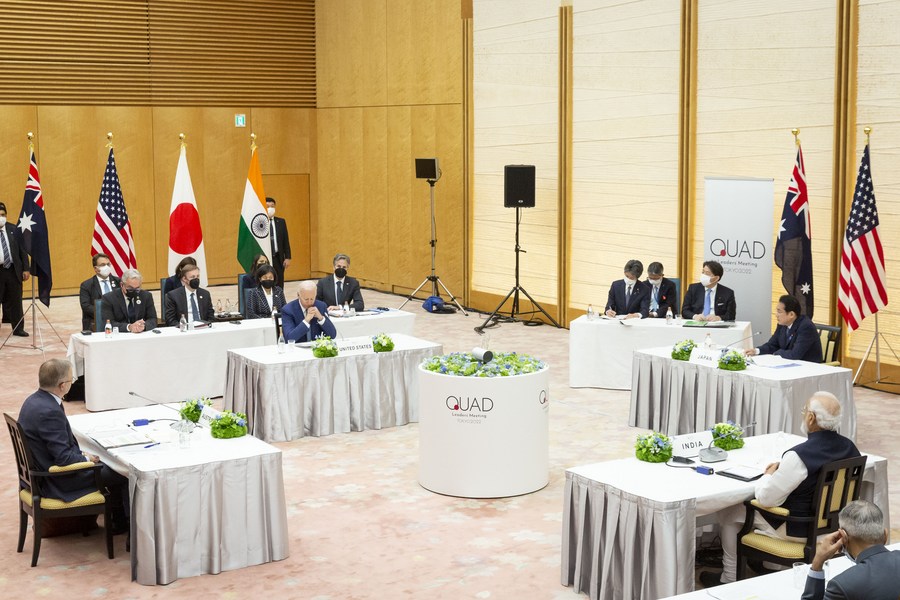China free to set Asia policy despite US
By YIFAN XU in Washington | China Daily | Updated: 2022-06-03 08:08

With 'its own destiny', Beijing's positive agenda can resist meddling, expert says
China should follow its own path and positive agenda for the Asia-Pacific region despite recent steps by the United States to enlist others to encircle it, according to a China expert.
"China is one of those few countries in the international system which is in control of its own destiny," Sourabh Gupta, a senior fellow at the Washington-based Institute for China-America Studies, told China Daily. "If it can attain the potential that it has inside, it doesn't have to depend on or wait for any country, including the US."
Over the past month, the US has conducted a series of moves relating to the region around China, including hosting the US-ASEAN Special Summit, announcing the so-called Indo-Pacific Economic Framework, or IPEF, and leading the Quad summit and issuing a joint statement with its partners.
The IPEF launch and the Quad summit were cast as highlights of Joe Biden's first visit to Asia as the US president in late May. The Quad brings together the US, Australia, India and Japan in a security arrangement viewed by many as an effort to contain China.
US Secretary of State Antony Blinken last week gave a comprehensive speech on China policy in which he defined the main theme of US-China relations as competition. He noted that the US would "shape the strategic environment around Beijing" and "win the competition for the future".
However, Gupta characterizes the US' recent initiatives as a "China-minus strategy".
"At the end of the day, a 'China-minus' strategy amounts to a China-encirclement strategy," he said.
"At this time, Washington knows that most countries in Asia are not ready to commit to such an encirclement strategy. As such, it has framed its strategy and policies-from the Quad to the IPEF-on the basis of a 'China-minus' formula."
And he expects that formula "will fail too because China sits at the heart of most of the region's economic, technology and developmental networks, and other countries do not have the depth of commitment or the deep pockets to challenge Beijing".
"Biden's expectation is that the relevant Asian countries will, at his prompting, strive to build further complementarity between their policies and the US' policies in these selective areas of decoupling," Gupta said.
China was not mentioned much at the US-ASEAN summit in Washington, during Biden's visit to Japan and South Korea, or at the Quad summit in Tokyo and in the joint statement that followed it.
But Gupta said China was the subtext in many important discussions and in the joint statement.
"The goal here is to give the impression that the Quad is not an anti-China encirclement body but one that has a positive agenda of practical cooperation to furnish public goods in the Indo-Pacific region," he said.
"I think aside from the four countries, nobody else is fooled in this regard. Everyone understands that the Quad is directed against China. And frankly, even within the four countries, there are very few takers of their foreign office-policy line that the Quad is not China-obsessed."
Before Biden's trip, China's top diplomat, Yang Jiechi, warned US national security adviser Jake Sullivan on May 18 that the US was "on the wrong path" regarding Taiwan, and that its moves could lead to "dangerous situations".
Wedge issue
Gupta said: "The Biden administration has not followed through in its deeds in terms of what the president himself promised in words to President Xi Jinping.
"As such, there is understandable apprehension in Beijing that Washington is attempting to use the Taiwan issue as a wedge issue and deepen divisions between China and other East Asian countries too."
When asked, Biden said the US would defend Taiwan militarily, but afterward, the White House, the State Department and Blinken, in his speech, said that recognition of the one-China policy would not change.
Gupta said it seemed like "a two-step play".
"This happened last October, and I fully expect it to happen again in the future," he said. "I don't think this has to do with lack of policy management. The president seems determined to politically show strength, not weakness, on Taiwan policy, and leave it to his White House team thereafter to restore the equilibrium on the finer details of the policy."
The US and Taiwan launched trade talks on Wednesday, a move that was strongly condemned by Beijing.
"Beijing cannot just wait for the US, and it's not a good idea also to be just waiting for when the US is going to engage and what the US is going to do or not do," said Gupta, suggesting that Beijing "be engaged in regional economic integration and integration with the Europeans", with its own positive agenda.
























